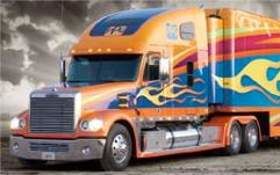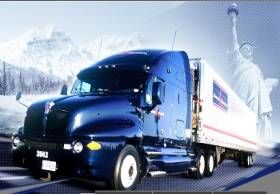Future Owner Operator
Topic 4815 | Page 1

want to know how much cheaper it is to get a truck with a low roof vs a sky rise roof if much cheaper should I consider buying a low rise roof to haul tanks, and skate boards in the future, or stick with dry vans and reefer to avoid 100% Gw with full loaded tank?
Well sir you got me. I figured by the title of the post that you at least knew something as basic as aerodynamics of a truck and had at least a few years into the industry. You're asking about two very different segments of the trucking industry that has totally different needs when it comes to fuel savings.
There are a million different factors when it comes to what truck to buy to get the better fuel savings but the trailer being pulled behind it is only a very small factor. You also have to include the freight type. The region of the country you will be running in. The average weight the loads will weigh. Time of year cause the air is less dense in the summer time and can flow through the engine easier than during winter time.
So I hope the title of your post means it's very very far into the future. That should give you time to learn more about fuel savings and how the over all aerodynamics is effected by a lot more factors than a truck or trailer.
Personally I rather have a condo, Cascadia, no matter the trailer. For one the Cascadia is one of the more fuel efficient trucks on the road. No matter it's it's a flatbed or tanker the size of the truck will keep a lot of the air pressure off the front of your load, which is where most of the air drag comes from due to the way trailers are load, in flatbedding.
BBut all that is a moot point really compared to the area on the country you will be running in.
Dry Van:
A trailer or truck that that requires no special attention, such as refrigeration, that hauls regular palletted, boxed, or floor-loaded freight. The most common type of trailer in trucking.Reefer:
A refrigerated trailer.

Take a look at Daniel B's post on "A look inside his LW", it's on page 1 at the moment. He gives a good script.

10-4 I was trying to start topic with fewest words.. I know I am still taking in the milk right now on the trucking industry, I'm a 7 month old in all this, that's clear. I am really just looking into something while I'm on the road later on maybe 2-5 years from now I feel like I "may" be able to run my own business because I have always had a business state of mind.. Landscaping, selling and trading things of that nature.. Being able to bargain and talk to customers..
But I know trailer has a lot of drag, and tankers haul a lot of legal gross weight loads.. Two things that weigh out on each other but really you can haul 80,000 lbs in a van too so on resistance you would be saving hauling 80,000 lbs I guess the difference is vans have more options so owner op can turn down heavy loads.. Idk? That's why I started the topic..
But the reason behind my post is merely curiosity on the fact that as long as I've been on the road I don't see many owner ops in the tanker business.. I thought it might be a good idea to have a low roof with a older style scoop to haul trailers or maybe just stick with a low resistance trailer like a tanker without a scoop.. Thank you for your response, I appreciate your honesty Over

that's insane, that's not how all the low roof are, but it's still crazy I get what he is saying but I couldn't drive 57 mph lol sorry but I sometimes drive 60 but it takes a hour before it starts feeling the same.. I'm already governed at 65
Take a look at Daniel B's post on "A look inside his LW", it's on page 1 at the moment. He gives a good script.

Tankers offen have very high liability due to the cargo that can be hauled in them. Not always but can and often does include hazmat. To big of a head ache. Besides company tanker drivers make pretty good money.
I have had two trucks of my own. I made money with them. And now I am a company driver and have a lot less stress.
There are trucks out here that are getting 8 plus mpg. It's not the truck so much as its the driver. You have to learn to drive for fuel mileage. That means slowing down to 58 to 60 mph.
HAZMAT:
Hazardous Materials
Explosive, flammable, poisonous or otherwise potentially dangerous cargo. Large amounts of especially hazardous cargo are required to be placarded under HAZMAT regulations
OWI:
Operating While Intoxicated

Yes, I think your exactly right, I read somewhere that owner operators have to pay a higher hazmat taxes.
That's another thing I drive a international pro star and I can get 8+ MPGs @ 60 MPH MT but any loads over 15 tons seems to drop it down to 6.7 then it goes downhill from there as the load goes up in weight, especially in the mountains, my company claims to give drivers fuel bonuses and pay raises based on fuel mileage plus milage itself, but I'm @ 40 tons on every load so I won't ever see it so I don't worry about it in a company truck. I tried to focus on it for a long time and drive @ 60 mph but I can make more money running that extra 200-300 miles at the end of the week if I run @ 65.
Thanks again driver I'm glad there are sites like this on the internet, something for us truckers, I have such a higher respect for truck drivers since I became one, you find that there is a lot of good hearted drivers out there willing to help out us newbies and we need that the most, much of us would rather ask a stupid question to a driver than a dispatcher any day lol anyways good talking to you
HAZMAT:
Hazardous Materials
Explosive, flammable, poisonous or otherwise potentially dangerous cargo. Large amounts of especially hazardous cargo are required to be placarded under HAZMAT regulations
Owner Operator:
An owner-operator is a driver who either owns or leases the truck they are driving. A self-employed driver.
Dispatcher:
Dispatcher, Fleet Manager, Driver Manager
The primary person a driver communicates with at his/her company. A dispatcher can play many roles, depending on the company's structure. Dispatchers may assign freight, file requests for home time, relay messages between the driver and management, inform customer service of any delays, change appointment times, and report information to the load planners.New Reply:
New! Check out our help videos for a better understanding of our forum features

















Preview:








 TT On Facebook
TT On Facebook
want to know how much cheaper it is to get a truck with a low roof vs a sky rise roof if much cheaper should I consider buying a low rise roof to haul tanks, and skate boards in the future, or stick with dry vans and reefer to avoid 100% Gw with full loaded tank?
Dry Van:
A trailer or truck that that requires no special attention, such as refrigeration, that hauls regular palletted, boxed, or floor-loaded freight. The most common type of trailer in trucking.Reefer:
A refrigerated trailer.